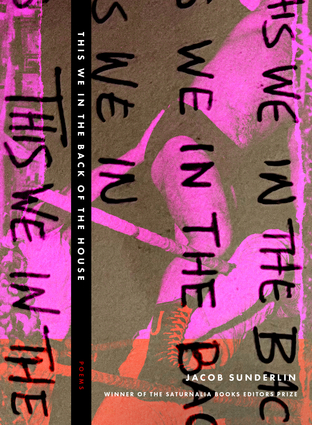Overview
Jacob Sunderlin’s first book of poems is measured in long shifts, out of sight of customers, written out in bleach, cigarette butts, and cheers to that we who work in the back of the house. Poems written the way stock pots are scoured with steel wool, the way bricks are laid with violent precision and exhausted resignation. These poems were dreamed by a head stuck inside a cement mixer, drunk on the language of work and the spoken we language creates. This is not the romanticized imaginary “Midwest” exploited by cynical politicians but a lyrical and even occult working-class landscape. Its we is made gentle by listening, by being in garages with apple-juice jugs of antifreeze underneath a sky hazed by contrails in the shape of Randy Savage and bootlegged diamonds of anti-helicopter lights while Appetite for Destruction whispers from a pile of burning leaves. This we is made of brothers, of the teenage bricklayer scamming free nuggets from Mickey Dees. These poems are sharp but loving, spoken in the light of a Coleman lantern from a boombox spread out on a blanket down by a river Monsanto owns. This we rides in a 1957 Chevrolet Bel-Air left parked out in a shed, windows half-down.Reviews
"The small towns and scrap-suburbs of the American Midwest mostly serve our media culture as scenes of nihilistic pride cultivated by the right or vexing and at times abhorrent parables pilloried by fundraisers on behalf of the left. Via some precision recipe of sheer skill in perception and bravery in feeling, and dashed with anger, pride, and, yes, some shame, Jacob Sunderlin's poems in This We In the Back of the House shatter, scatter and reclaim what we know and feel about the working class that labor and capital colluded to leave behind late in the 20th century. The living truths so courageously fused herein are tenaciously human." —Ed Pavlic, author of Let it Be Broke
"If I tell you this is a collection about labor, you might be tempted to presume a brooding sensibility. 'Why is it narcotic, / standing in the mud, in a field, / passing a joint & watching a hog / try to mount another hog / and talking about work?' But these sly, gothic, at times operatic poems brightly complicate what we know about inheritance and debt. I hunkered down with these indelible riffs on brothers, burritos, a Chevy Bel Air, chemtrails, wrestling holds and the wisdom of Sugar. Adept with anaphora and sound play, Jacob Sunderlin gives this material skin and soul, inviting us in: 'Let each knuckle bust // write its new arc.'" —Sandra Beasley, author of Made to Explode
"In this compelling first collection, Jacob Sunderlin pays his debt, so to speak, to his working-class background by transforming it into pure poetry. 'Sooner or later, this shift is over, / our cigarettes lit so the cherry is held / against the factory dark.' Family and friends, thankless jobs, even WrestleMania and the pimply kid working behind the counter at McDonald’s, are poignantly etched in Sunderlin’s clean, incisive lines. His language redeems a way of life that’s 'mostly // wasting time, half done.' There are no half measures here; nothing is wasted. This 'realistic song' is rendered artfully, and with unflinching heart." —David Trinidad, author of Digging to WonderlandAuthor Biography
Jacob Sunderlin is the author of This We in the Back of the House (Saturnalia Books, 2022). His poems appear or are forthcoming in Bennington Review, Gettysburg Review, Narrative, The New Yorker, Ploughshares, and elsewhere. The recipient of support from the National Endowment for the Arts, The Fine Arts Work Center in Provincetown, and the Djerassi Resident Artists Program, he teaches at a public high school in Indiana.

